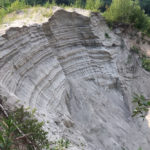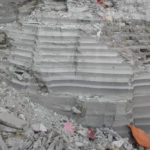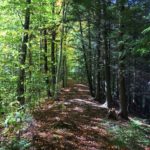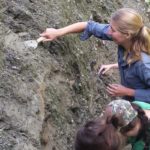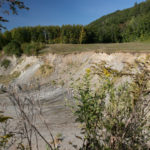Glacial Geology of the Champlain Valley

Instructor: Stephen Wright
May 27 - 28, 2023 | CANCELLED
Course size: 12 students
Please Contact Us to request scholarship assistance
Course meets in the greater Burlington area
T
his class visits multiple field sites to explore key aspects of Vermont’s glacial geologic history. In particular, we will observe a variety of landforms and sediments in the Burlington and Richmond area, focusing on the different geologic processes that yielded these formations. We will then use this understanding to interpret the changing environments existing in the Champlain Valley during the last 25,000 years. We will visit features such as ancient lake bottoms, deltas, kames, terraces, glacial striations, and eskers to piece together the story of glaciation, Glacial Lake Vermont, and the Champlain Sea. This class serves as an overview of Champlain Valley surficial geology, as well as a practicum for learning how to interpret similar features anywhere in the world.
Course Objectives
- To learn how field observations of sediments and landforms are used to interpret the glacial geology of the region.
- To recognize the different types of sediments and landforms formed in glacial environments.
- To understand the processes taking place as those sediments and landforms are created.
- To interpret the changing environments existing in Vermont from peak glaciation to ice sheet retreat.
About the Instructor(s)
Stephen Wright is a former Senior Lecturer in the Geology Department at the University of Vermont and regular contributor to the Vermont Geological Survey. His current research utilizes extensive field work to further our understanding of the glacial history of northern Vermont. This work includes understanding the dynamics of ice flow and water flow within the big ice sheet that once covered Vermont and the histories of the many glacial lakes dammed by that ice sheet.
Recommended Readings
Books
- Bennet, M.R. and Glasser, N.F., First or Second Edition, “Glacial Geology: Ice Sheets and Landforms”
Articles and Field Trip Guides
(Don't be frightened away by the advanced content level. Just see if you can familiarize yourself with some of the big-picture concepts.)
- Wright, S.F., 2015, Late Wisconsin ice sheet flow across northern and central Vermont, USA; Quaternary Science Reviews, Vol 129: 216–228.
- Wright, S.F., Springston, G.E., and Van Hoesen, J.G., 2015, Ice retreat and readvance across the Green Mountain Foothills: Bolton and Jericho, Vermont; New York State Geological Association Guidebook Vol. 87: 327–352.
Equipment
Other than standard gear needed for spending most of the day outside, please bring a hand lens for examining sediment samples up close.
Timing
Course begins 9 AM on Saturday **in the greater Burlington area (TBD)**. Course convenes on Sunday at a time of the instructors' choosing. Course concludes by 5 PM on Sunday.
Academic Credit / Professional Development
This course may qualify for 1 graduate-level credit for an additional $200 course fee. All BioU courses are accredited by Castleton University. Participants interested in receiving credit must contact us at least 2 months in advance so we have time to arrange course accreditation.
It is the student’s responsibility to ensure that home institutions will accept the credit. Participants pursuing academic credit will be required to complete an additional assignment above and beyond the course hours, including literature review, reflective writing, or a field-based project.
This course qualifies for 20 hours of professional development hours and continuing education units. Certificates of completion are provided at the conclusion of the course.
Cancellation Policy
While we realize that unexpected circumstances arise that are out of our control, North Branch Nature Center cannot guarantee refunds for registrations cancelled within 30 days of the course. If a cancellation occurs within this window, NBNC will attempt to fill the space from our wait list and provide a full refund. If the course needs to be cancelled by NBNC, we will provide a full refund.

713 Elm Street
Montpelier, Vermont 05602
(802) 229-6206
Hours: Center Open Monday-Friday 9-4
Trails Open 24/7

